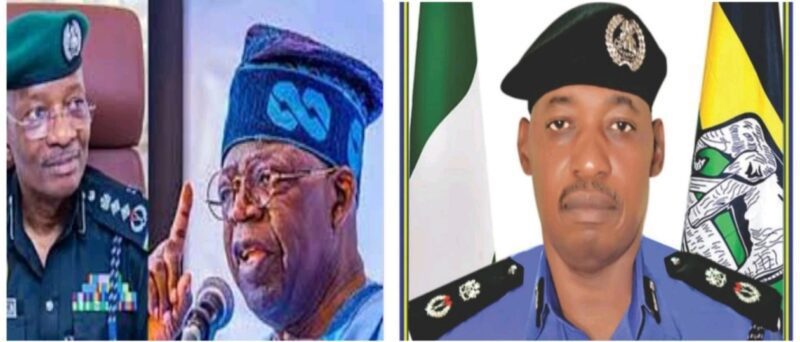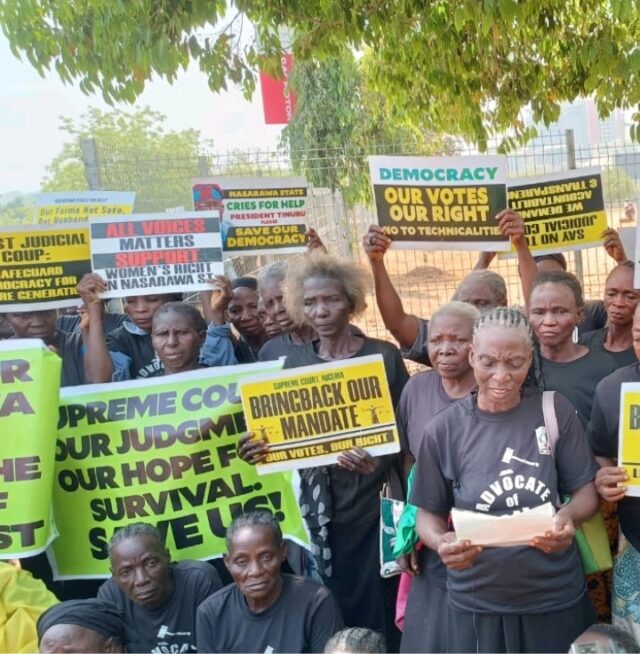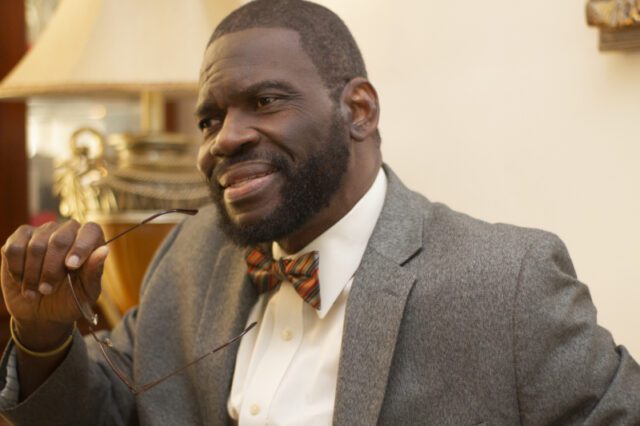Democracy & Governance
President Tinubu’s Urgent Responsibility to Protect the Rights of Nasarawa’s Women Protesters and Others -By John Egbeazien Oshodi
Amid these protests, an often-overlooked facet is the emotional well-being of the participants. Concerns center on the potential trauma and distress experienced by those who immerse themselves in these fervent demonstrations. This emotional aspect cannot be underestimated, underscoring the need for President Tinubu to assume a pivotal role in ensuring the emotional well-being of his constituents.

Amid the ongoing protests echoing through the streets of Nasarawa State, a pressing imperative emerges. President Tinubu must now seize the moment and urgently appeal to Inspector-General of Police (IGP) Olukayode Egbetokun and Commissioner of Police Shehu Umar Nadada to cease any further interference with the peaceful demonstrators. This appeal is particularly crucial for the women who form a significant part of these protests, alongside many others. Alarming reports of arrests and the denial of bail to these demonstrators necessitate immediate action. The stakes extend beyond the state’s borders, carrying the risk of both global and national embarrassment. It is vital to underscore that while no one endorses or encourages violence among protesters, it is equally essential to acknowledge that trust in the police and other governing bodies has significantly eroded.
This erosion has reached a juncture where individuals are compelled to raise their voices and air their grievances, regardless of the potential repercussions. At the forefront of our concerns lies the need to safeguard the rights and dignity of these women and protesters. Their voices must be allowed to resonate without resorting to measures that could subject them to international and national scrutiny, potentially tarnishing the democratic values we cherish deeply.

I, as a concerned Nigerian native, am calling upon the President to exercise restraint and uphold the principles of democracy amid the ongoing protests in Nasarawa State, Nigeria. This appeal reflects deep-seated concerns about the current situation and its potential implications for democratic values.
Amid the ongoing protests in Nasarawa, it is crucial to recognize the profound impact that such demonstrations and confrontations between citizens and law enforcement can have. The emotional toll that these events exact upon individuals, particularly women who actively participate in these protests, cannot be underestimated. The imperative for President Tinubu to consider the well-being of his constituents emerges as a pivotal facet of this heartfelt plea.
In the context of protests led by women, it is imperative to emphasize that the fundamental principles of dignity and respect must always prevail. While these protesting women exercise their rights to voice their concerns and grievances, it is essential to discourage any forms of protest that may involve nudity or indecent exposure. Such actions could not only risk the safety and well-being of participants but also have the potential to overshadow the message and goals of the protest. It is paramount to prioritize peaceful and lawful demonstrations that uphold the dignity and rights of all individuals involved, particularly vulnerable groups like women. Safeguarding their rights while ensuring their voices are heard should remain a top priority in the democratic process, and this should never be used as a justification for abuse, manhandling by the police, or denial of bail.
The plea underscores the paramount importance of advocating for peaceful resolutions during periods of social unrest. Instead of resorting to heavy-handed measures, the call for restraint urges President Tinubu to explore peaceful avenues conducive to dialogue and conflict resolution. This approach harmonizes seamlessly with fundamental principles of conflict management and underscores the significance of prioritizing non-violent means to address grievances.
Inextricably intertwined with these demonstrations are the core tenets of democracy, anchored in the principles of freedom of expression and peaceful assembly. The plea resonates with the need to safeguard these democratic values, emphasizing the irreplaceable role they play in maintaining a robust democracy. Allowing citizens to express their concerns without apprehension of punitive consequences is a bedrock principle for the preservation of a healthy and thriving democratic system.
Amid these protests, an often-overlooked facet is the emotional well-being of the participants. Concerns center on the potential trauma and distress experienced by those who immerse themselves in these fervent demonstrations. This emotional aspect cannot be underestimated, underscoring the need for President Tinubu to assume a pivotal role in ensuring the emotional well-being of his constituents.
Integral to a flourishing democracy is the element of trust between the government and its citizens. The plea highlights the criticality of fostering and sustaining trust through leadership characterized by empathy and responsiveness. The exercise of restraint in dealing with protests can play a pivotal role in cultivating and bolstering trust, nurturing an environment conducive to cooperation.
Drawing upon insights from the realm of conflict management, the plea delves into the concepts of mental health and resilience. Acknowledging and addressing the impacts that protests and social unrest can have on mental well-being is paramount. President Tinubu’s potential contribution to the mental well-being and resilience of the community cannot be underestimated, making it an integral part of this plea.
Furthermore, the plea ardently stresses that both the President and the governor lack the authority to curtail the constitutional right of citizens to engage in peaceful protests. In Nigeria, the right to protest stands as an indomitable pillar of democratic principles. The citizens’ constitutional prerogative to express their grievances through peaceful demonstrations must be respected and safeguarded by the government.
Addressing the concerns surrounding potential political pressures influencing the actions of magistrates and the police, the plea underscores the imperative of maintaining the independence of legal proceedings. The presence of such pressures is not uncommon in Nigeria, and their influence on the handling of legal matters and protests necessitates a concerted effort to preserve the sanctity of legal proceedings, ensuring that they remain impervious to political interference and adherent to the rule of law.
Furthermore, the plea ardently stresses the significance of learning from the past, specifically the 2020 #EndSARS protests, in order to avoid replicating the excessive use of force and violence against protesters. The lessons gleaned from these previous events underscore the compelling necessity to pursue peaceful and constructive avenues for addressing grievances, steering clear of tactics that precipitate violence.
In conclusion, the arrest of protesters in Nasarawa State serves as a poignant reminder of the intricate interplay between maintaining public order and upholding fundamental human rights. International agreements, such as the Universal Declaration of Human Rights and the International Covenant on Civil and Political Rights, underscore the paramount importance of safeguarding these rights, including the freedom of expression and peaceful assembly.
Nigeria’s commitment to these agreements necessitates a delicate balance between maintaining peace and respecting the rule of law.
The arrest of protesters based on their alleged violation of a peace agreement and/or other alleged protest-related acts calls into question the compatibility of such agreements with both national and international human rights standards. While preserving peace and order remains a legitimate concern, it is imperative that any constraints imposed on these rights are proportionate, necessary, and firmly rooted in the principles of justice.
Furthermore, the international community, including esteemed organizations like the United Nations, closely monitors the protection of human rights and the rule of law in member states. Actions that appear to infringe upon these rights can draw international scrutiny and concern, potentially tarnishing a nation’s reputation on the global stage.
Therefore, Nasarawa State’s recent events underscore the need for a judicious and balanced approach, one that preserves public order while unwaveringly upholding the bedrock principles of freedom of expression and peaceful assembly. This serves as a resounding reminder of the paramount importance of respecting these rights within the framework of democracy and the rule of law, not only at the national level but also on the international stage.
Furthermore, the international community, including esteemed organizations like the United Nations, closely monitors the protection of human rights and the rule of law in member states. Actions that appear to infringe upon these rights can draw international scrutiny and concern, potentially tarnishing a nation’s reputation on the global stage.
Therefore, Nasarawa State’s recent events underscore the need for a judicious and balanced approach, one that preserves public order while unwaveringly upholding the bedrock principles of freedom of expression and peaceful assembly. This serves as a resounding reminder of the paramount importance of respecting these rights within the framework of democracy and the rule of law, not only at the national level but also on the international stage.

Professor John Egbeazien Oshodi, born in Uromi, Edo State, Nigeria, is an American-based police and prison scientist, forensic psychologist, and legal psychologist. He’s a government advisor on forensic-clinical psychological services in the USA and the founder of the Dr. John Egbeazien Oshodi Foundation for Psychological Health. With a significant role in introducing forensic psychology to Nigeria through N.U.C. and Nasarawa State University, he’s also a former Secretary-General of the Nigeria Psychological Association. He’s taught at esteemed institutions like Florida Memorial University, Florida International University, Nova Southeastern University, and more, and is currently an online faculty member at Weldios University, Nexus International University, and Walden University. John.Oshodi@mail.waldenu.edu



















